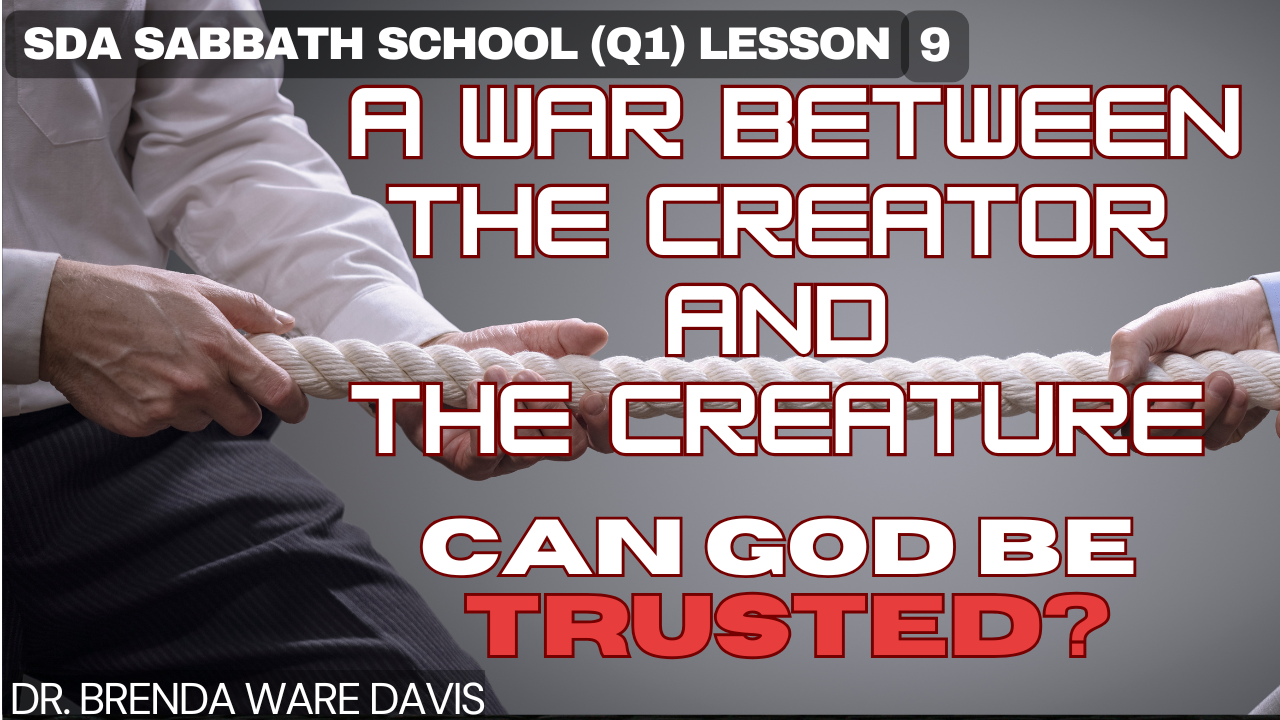MANAGING FOR THE MASTER (Lesson 9) Beware of Covetousness Day 1-2 The Ultimate Original Sin
IS IT A NEED OR GREED: Have you ever found yourself wanting something so badly that you couldn’t stop thinking about it? It may have been a new car, a bigger house, or the newest smartphone. You were convinced that life would be far better with it than without it. But what happens when that desire controls you?
In our previous lessons, we talked about how to be successful with money by wisely managing the resources God has given us. We agree that to successfully manage the money and possession God has given us; we must put God first in our finances and in all that we do. Now we will look at something that is a serious matter – covetousness. Covetousness is when we are never satisfied with what we have and are always wanting more.
It can take us into dangerous territory. What is the danger in covetousness?
We’re going to look at the dangers of covetousness and its potential to lead us down a path to destruction.
Review any of our previous lessons @ SabbathSchoolDaily.com.
Also, you can obtain the study guide to these lessons @ Sabbath.School or ssnet.org (Split)
Inviting God’s Presence
Dear God, please help us find contentment in what we have. Forgive us for any past excessive desires for the things we do not have and cannot afford. In Jesus’ Name, Amen
Covetousness has to do with having the excessive desire to possess wealth or material goods that do not rightfully belong to us. This desire can be so strong that it leads individuals to behave unethically or commit immoral acts such as lying, stealing, or even killing.
It is so damaging that Jesus in Luke 12:15 warns against it.
15 And He said to them, “Take heed and beware of covetousness, for one’s life does not consist in the abundance of the things he possesses.” (Luke 12:15)
In fact, In the ten commandments, God explicitly warns against covetousness in Exodus 20:17.
17 “You shall not covet your neighbor’s house; you shall not covet your neighbor’s wife, nor his male servant, nor his female servant, nor his ox, nor his donkey, nor anything that is your neighbor’s.” (Exodus 20:17)
Covetousness is so bad that it is even listed alongside other serious sins in 1 Corinthians 6: 9 and 10 that can prevent us from inheriting the kingdom of God.
9 Know ye not that the unrighteous shall not inherit the kingdom of God? Be not deceived: neither fornicators, nor idolaters, nor adulterers, nor effeminate, nor abusers of themselves with mankind,(Split)
10 Nor thieves, nor covetous, nor drunkards, nor revilers, nor extortioners, shall inherit the kingdom of God. (I Corinthians 6:9-10 KJV)
Covetousness is right up there with extortion, idolatry, fornication, and adultery?
Covetousness is desiring someone else’s possessions: This could be anything from coveting your neighbor’s car or house to wanting a friend’s job or relationship.
It’s important to remember that everyone’s journey is different and we should focus on being content with what we have.
Here are some examples of covetousness:
Obsessing over money: Money can be a major source of covetousness for many people. We may become fixated on accumulating wealth or acquiring expensive items, and in doing so, lose sight of what’s truly important in life.
Comparison and envy on social media: Social media has made it easier than ever to compare ourselves to others and feel envious of their lives. This can lead to a constant desire for more, even if it’s not something we truly need or want.
Competitiveness: In some cases, covetousness can manifest as a desire to outdo others in terms of success or accomplishments. While ambition and healthy competition can be positive motivators, when they are driven by envy or jealousy, they can lead to negative outcomes.
Hoarding: Holding onto possessions or resources we don’t truly need can be a sign of covetousness. This could be anything from clothes we never wear to items we don’t use, to holding onto money we don’t need rather using it to help others in need.
It’s important to remember that while we may struggle with covetousness in one way or another, we can overcome it by depending on the power of the Holy Spirit and focusing on gratitude and contentment with what we have.
By recognizing the blessings in our lives and being mindful of our thoughts and actions, we can avoid falling into the trap of covetousness and instead live a more fulfilling and joyful life.
Hence this week, we will explore various examples of covetousness in the Bible and examine the destructive effects that it can have on individuals and communities.
We will also discuss strategies for avoiding covetousness and finding contentment in our current circumstances, recognizing that true happiness and fulfillment come from God and not material possessions.
Speaking of covetousness, have you ever wondered how sin came to be in God’s universe?
It’s a common question and its understandable why people are curious about it. At the heart of it is covetousness. It is even perhaps the ultimate original sin.
Isaiah 14:12-14 offer some clues. It tells us about the fall of Lucifer and how covetousness played a critical role in his downfall.
Isaiah 14:12-14
12 “How you are fallen from heaven, O Lucifer, son of the morning! How you are cut down to the ground, You who weakened the nations!
13 For you have said in your heart: ‘I will ascend into heaven, I will exalt my throne above the stars of God; I will also sit on the mount of the congregation On the farthest sides of the north;
14 I will ascend above the heights of the clouds, I will be like the Most High.’ (Isaiah 14:12-14)
According to Patriarchs and Prophets, Lucifer wasn’t content with his high position, even though he was honored above the rest of the heavenly host. “Not content with his position, though honored above the heavenly host, he ventured to covet homage due alone to the Creator. Instead of seeking to make God supreme in the affections and allegiance of all created beings, it was his endeavor to secure their service and loyalty to himself. And coveting the glory with which the infinite Father had invested to His Son, this prince of angels aspired the power that was the prerogative of Christ alone.” Patriarchs and Prophets, p. 35.
And get this: Paul equates covetousness with idolatry in both Ephesians 5:5 and Colossians 3:5.
Ephesians 5:5
5 For this you know, that no fornicator, unclean person, nor covetous man, who is an idolater, has any inheritance in the kingdom of Christ and God. (Ephesians 5:5)
Colossians 3:5
5 Therefore put to death your members which are on the earth: fornication, uncleanness, passion, evil desire, and covetousness, which is idolatry. (Colossians 3:5) (Split)
Yes, that’s right – idolatry. It’s like when people worship something other than God, dedicating their lives to created things rather than the Creator according to Romans 1:25.(Split)
25 who exchanged the truth of God for the lie, and worshiped and served the creature rather than the Creator, who is blessed forever. Amen. (Romans 1:25)
The commandment against covetousness, the only one that deals with thoughts alone, can prevent us from breaking the other commandments. (Split)
For example, check out 2 Samuel 11, where King David stays in Jerusalem while his army fights the Ammonites. One evening, he sees Bathsheba bathing and sends for her. They sleep together, and Bathsheba becomes pregnant. To cover up his adultery, David summons Bathsheba’s husband, Uriah, back from the front lines and encourages him to spend the night with his wife. But Uriah refuses, so David orders him to be placed on the front lines, where he is killed. David then marries Bathsheba, but the Lord is displeased with what David has done.
In 1 Timothy 6:6-7. Paul reminds us that we brought nothing into this world, and we can take nothing out of it.
6 Now godliness with contentment is great gain.
7 For we brought nothing into this world, and it is certain we can carry nothing out. (I Timothy 6:6-7)
Focusing on this can help protect us from covetousness because it reminds us that material possessions are temporary and ultimately have no eternal value.
So, what’s the bottom line here? Covetousness is dangerous because it can lead us to put our desires above God, which ultimately leads us down the wrong path.
But by focusing on what’s really matters in life and remembering that material possessions are temporary, we can protect ourselves from the allurement of covetousness. (Split)
Remember, when we put God first in our hearts and lives, we can avoid falling into the trap of covetousness and stay on the path to righteousness. We can see just how bad covetousness is when we read about King David, in which covetousness leads him down a really bad road. How serious is covetousness to God? Find out in Day 3 An Accursed Thing in the Camp.
If you wish to return the tithe
or give an offering
consider giving online,
@ Adventistgiving.org
my local Church:
Hebron Seventh-day Adventist Church
7902 Wheatly Street
Houston, TX 77088














Post Comment